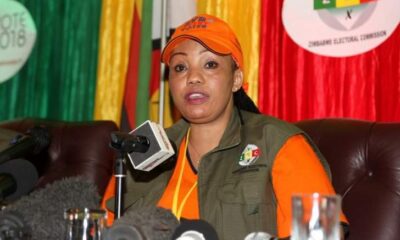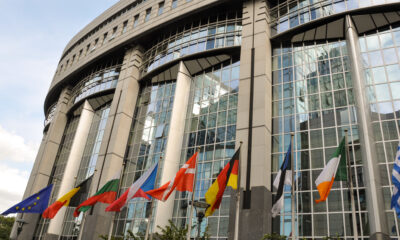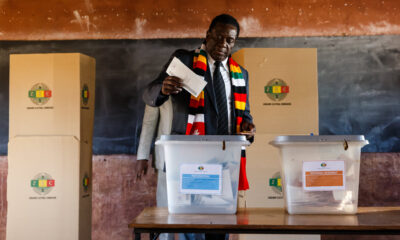
News
EU observer mission report nails Zec
Published
2 years agoon
By
NewsHawksTHE European Union Election Observer Mission (EU EOM) has condemned the Zimbabwe Electoral Commission (Zec) for failing to properly run the 23 August 2023 general election, saying the playing field was not level, bringing into question the credibility of the poll.
RUVIMBO MUCHENJE
In the final report released on Friday, the EU observer mission said lack of communication from the Chapter 12 commission reflected a lack of transparency.
“The 23 August 2023 harmonised elections in Zimbabwe were marked by a curtailment of rights and freedoms and the lack of a level playing field, which limited voters’ ability to make their choices in a genuinely free and pluralistic environment. A palpable fear of violence underlay the electoral process throughout, and a climate of retribution developed after the elections,” read the executive summary of the report presented by the head of mission, Fabio Massimo.
On transparency, Zec was conducting and administering elections, but communication around polls was not reaching the electorate as efficiently as it should. The observer mission noted that the short[1]comings in communication eroded the little trust that the electorate had in Zec to fairly run the elections.
“A lack of guarantees for independence, transparency, and significant delays in the opening of a considerable number of polling stations on election day reduced public trust in Zec and the efficiency of the electoral preparations. Throughout the electoral period, Zec’s activities were characterised by a lack of transparency and insufficient communication,” reads the report.
Voters in most urban centres got to the voting centres as early as 5am, but no communication was coming to them on the delay and when polling could actually commence.
This led to some leaving the queues and coming back the following morning only to be told that polling stations were closed. Further, there were violations of the electoral law on provisions of the voters’ roll. Section 21(4) of the Electoral Act states that voters’ rolls should be availed within a reasonable time frame.
“Within a reasonable period of time after the calling of an election, the Commission shall provide, on payment of the prescribed fee, to every political party that intends to contest the election, and to any accredited observer who requests it, one copy of every voters’ roll to be used in the election, either in printed or in electronic form as the party or observer may request,” reads Section 21(4).
But, the EU EOM noted that the voters’ roll was availed after a hard tussle.
“In the run up to the elections, there were serious contests between Zec and the opposition Citizens’ Coalition for Change on the access to the voters’ roll. The integrity of voter registration was contentious due to delays in sharing of the voters’ roll with stakeholders and widespread allegations of inaccuracies in the database. In addition, the changes made close to Election Day were not communicated by Zec to the public, further decreasing public confidence,” reads the EU EOM report.
In addition to that, there was the confusing aspect of the Electoral Amendment Act that permitted the use of youth quotas in the election of 2028, as it had passed the deadline for amendments that could be used in the 2023 election.
The provision is constitutional, but had no supporting legal framework.
“Constitution amendments in 2021 incorporated some changes to the electoral system, with women and youth quotas, and the removal of the vice-presidential ticket. These changes were incorporated into the Elector[1]al Act on 19 July 2023, after elections were called for on 31 May. Thus, they only apply to future elections. In the absence of law, Zec decided to apply constitutional provisions directly. However, the regulatory framework was insufficient, and it lacked important procedural details. Moreover, Zec’s decisions and regulations were not consistently published or uploaded to Zec’s website, compromising the principles of transparency, accessibility, and legal certainty. Legislative clarity was also precluded by the lack of availability of updated legal texts. Consolidated versions of laws containing the latest changes were not readily available to citizens,” read the report.
The information was not transmitted to the electorate. Nomination fees elbowed out other players Nomination fees for members of Parliament, party lists and presidential candidates were pegged so high that it elbowed out other prospective candidates.
The EU EOM noted that although there were many participants, diversity was limited because of the exorbitant fees.
“Voters were offered political alternatives, but the overall inclusivity of the candidate registration process was reduced because of un[1]due requirements and inconsistent application of the rules by Zec and nomination courts. The high fees and inconsistent application of procedures meant that more than one-fifth of aspiring presidential and parliamentary candidates were not admitted to the contest. This meant that administrative measures were used to limit citizens’ fundamental right to stand and that voters had a narrowed choice,” reads the report.
The EU EOM recommended that this be reviewed for the upcoming elections. “. . . candidate registration exorbitant fees also act as obstacles and help to explain why there were just 2 young MPs in the last NA [National Assembly] and just 3 running now as directly NA elected candidates,” they recommended. Lack of independence of the commission.
The EU EOM noted that the provision that regulations used by Zec could be approved by the minister of Justice and Parliamentary Affairs was subject to scrutiny by the electorate because of the heavy party-state conflation of Zanu PF and the government of Zimbabwe.
Ministers are also political appointees and their inclination towards what is best for their party is inevitable in policymaking .
“While the election administration may adopt regulations to specify provisions of the Electoral Act, these require prior approval from the Ministry of Justice (MoJ).This de[1]pendency on the MoJ, together with some Zec decisions that were perceived to favour the ruling party, as well as connections between some Zec commissioners and ruling party officials called into question the election administration’s ability to operate as a fully independent body. Priority recommendation: Ensure that Zec and its staff are able to operate without political influence at all levels, including in their appointment mechanisms and by removing governmental approval of its regulations,” notes the EU EOM.
A flawed election
Many people in urban centres were left dis[1]enfranchised after the electoral commission failed to deliver ballots on time.
There was a general feeling among voters that Zec was used by the ruling party to tilt the odds in Zanu PF’s favour.
“Prior to election day, there was a broad public consensus about Zec’s capability to effectively manage the process. Pre-election preparations largely followed the established timeline. However, delays were noted in the printing of ballot papers for electoral constituencies affected by court disputes over candidate registration, which also affected the timeline for postal voting.
In addition, on election day, the late delivery of ballot papers led to delayed opening of several hundred polling stations, severely impacting the voting rights of a high number of voters”
“Throughout the electoral period, Zec’s activities were characterised by a lack of transparency and insufficient communication. Decisions and regulations of Zec were not consistently published. The election administration disclosed only the information minimally required by law to stakeholders, and the published data was often incomplete or released in formats difficult to analyse. In general, Zec did not adequately address public concerns, such as those related to voter registration, candidate registration, printing and delivery of ballot papers, and election results management. Despite good access to lower-level offices, the EU EOM had difficulties receiving information from Zec at the nation[1]al level.”
The EU EOM recommended a clear line of communication to boost the image of Zec on matters of transparency.
“Priority recommendation: Zec to provide timely and comprehensive information on all aspects of electoral preparations to the public, including its decisions and regulations,” reads the report. In line with the process was the postal voting saga. People eligible to postal voting reportedly voted under the supervision of their superiors, a breach of section 74 of the Electoral Act which states that the chief elections officer will only receive the ballots in an envelope and seal them before posting to the postal voter’s polling station, but the EUEOM noted that this was not the case with some police stations.
“Based on credible information received from affected voters, voting in some police stations was overseen and potentially influenced by commanders, which might have compromised the secrecy of the vote,” reads the report.
The police told the EU EOM that there was no stipulated procedure in conducting the postal voting. Although this was challenged by the op[1]position CCC after damning videos surfaced on social media, the challenge died a natural death with no results.
“The police informed the EU EOM that there are no provisions for postal voting to be conducted in an organised manner. However, the EU EOM received credible information on at least two occasions about postal voting in a police barrack occurring under the supervision of commanders. On 7 July, CCC requested Zec to clarify the eligibility criteria for postal voting and demanded guarantees that such voting would be conducted free from undue influence. Zec did not formally respond to this request,” noted the observer mission.
Zec approved 17 606 applications from police, military personnel, election officials, and diplomats stationed abroad.
Due to delays in ballot printing, Zec extended the deadline for receiving postal ballots up to three days prior to election day. In general, postal votes were transferred to voters on 15 and 16 August.
Delimitation
Zec is mandated to review electoral constituency boundaries after each population census, no later than six months before the next elections, to ensure the equality of voting power.
The latest delimitation, preceded by a mobile registration drive and legally required consultations with stakeholders, was carried out in 2022.
A preliminary report, proposing the redrawing of several National Assembly constituencies and an increase in the number of wards from 1 958 to 1 970 was presented by Zec to Parliament on 26 December.
The report drew criticism from a wide range of stakeholders, including ruling party and opposition representatives and some Zec commissioners. An ad hoc parliamentary committee found that the formula applied by Zec to determine voter population per constituency did not align with the respective constitutional provisions.
Moreover, civil society analyses revealed additional shortcomings in Zec’s report, including constituencies that surpassed or fell short of the permitted voter population and other arithmetic inconsistencies.
Some cases of realignment of constituency boundaries raised concerns of potential gerrymandering in favour of the ruling party. Zec dismissed the criticism, and after some corrections, which did not impact the formula to determine the voter population, the president enacted the fi[1]nal delimitation report on 20 February 2023.
Overall, public trust in the delimitation pro[1]cess was low and the lack of information on the realignment of polling stations resulted in widespread uncertainty among voters about voting locations on election day.
Elbowing out CSOs
“By law, Zec is responsible for conducting voter education. While CSOs can engage in such activities upon special accreditation from Zec, the election administration did not process the submitted requests promptly, effectively preventing the applicant organisations from providing voter education (see Citizen and International Election Observation).
From 27 July to 16 August, Zec launched a nationwide voter education campaign through in-person meetings, leaflets, and social media.
The campaign focused on voting steps and specifically targeted women and youth in English, Shona, and Ndebele.
The information provided on voting procedures was comprehensive, overall. However, the campaign did not fully clarify the complex nature of the electoral system, especially how voters’ choices translate into actual seats.
To assist voters in identifying their polling stations, Zec conducted a door[1]to-door information campaign, established an SMS service and instructed polling stations to display the lists of registered voters two days before election day.
However, many polling stations did not post these lists until the day of the election. The EU EOM also observed a significant number of voters having difficulty finding their designated polling stations on election day, suggesting that Zec’s voter education efforts were not fully effective in this regard.”

Voters’ roll
“The integrity of the voters’ roll was a significant point of contention throughout the electoral period. Registration figures provided by Zec were often partial or inconsistent, and the format of the published data was not conducive to comprehensive analysis. In some instances, Zec modified already published data without explanation or justification. There was limited public information about measures undertaken by Zec to verify the accuracy of the voters’ roll, remove potential duplicates or erroneous entries from the database, and ensure the protection of voters’ personal information. Despite an obligation to initiate the deregistration of voters residing abroad for over 18 months, this provision was applied only upon third-party requests and not ex officio. The law makes the voters’ roll a public document and mandates Zec to provide electronic or hard copies ‘within a reasonable period of time’ to those who request it. However, in the months preceding the elections, Zec withheld the electronic copy from stakeholders, citing concerns over data privacy. After repeated requests and legal challenges by CCC against Zec, the ‘final’ electronic voters’ roll was provided to parties as late as on 10 July. In addition, it set a US$187 000 fee (US$1 per page) for each printed copy, contrary to legal provisions that require ‘reasonable cost.”
An analysis of this voters’ roll by a civil society group revealed numerous shortcomings, potentially affecting the voting rights of sever[1]al thousand voters.
These included voters listed in incorrect constituencies, the use of invalid ID numbers, and high numbers of voters registered at certain addresses.
Furthermore, there were indications that Zec made changes to the ‘final’ voters’ roll after releasing it to political parties, in some cases to rectify inaccuracies, including those highlighted by the civic analysis.
The lack of official information about these changes further decreased public trust in the voter registration process.
The observer mission recommended that Zec should undertake a comprehensive audit of the voters’ roll and proactively disclose all relevant information regarding voter registration, including its efforts to ensure the accuracy of the database.
All stakeholders to be granted meaningful and timely access to the final voters’ roll in analysable formats before election day.
Exclusion from participation
A total of 11 presidential candidates, and 657 National Assembly candidates registered to run for the 210 National Assembly constituencies, with Zanu PF and the CCC being the only parties fielding candidates in all 210 constituencies. Fourteen parties sponsored 590 National Assembly candidates, and 67 ran as independents.
Five parties filed lists for the Senate, four for the National Assembly women’s quota and three for the youth quota. They contained 144 senatorial candidates, 138 women to fill the quota and 42 youths.
Some 5 000 candidates registered to contest the 1 970 local ward seats; only Zanu PF nominated candidates in all wards.
In 91 wards and in Bulawayo provincial council, Zanu PF candidates stood unopposed, thus rendering them winners without an election. Women made up less than 15 per cent of all candidates registered.
Although voters were offered a choice of political alternatives, with an average of three candidates per seat, the overall inclusivity of the candidate registration remained limited.
The unduly high registration fee increased by 2 000 percent for presidential and parliamentary candidates.
Zec arbitrarily demanded US dollar cash payments in most cases. These elements constituted obstacles to inclusivity and an unreasonable hurdle to registration, at odds with international standards.
A review of candidate registration requirements should be made to see they are in line with international commitments and their implementation consistently applied by Zec.
The report noted that the lack of guarantees for independence, transparency, and significant delays in the opening of a considerable number of polling stations on election day reduced public trust in Zec and the efficiency of the electoral preparations.
Throughout the electoral period, Zec’s activities were characterised by a lack of transparency and insufficient communication.
You may like
-


EIB mulls new €40 million Zim private sector facility
-


By-elections lacked credibility
-


Delays in US$300 million Kariba Dam wall project irk financiers
-


EU awaits positive signal from Harare
-


Sadc’s election report leaves Mnangagwa desperately out in the cold with only one option — reform
-


Polls lacked credibility: Carter Centre








